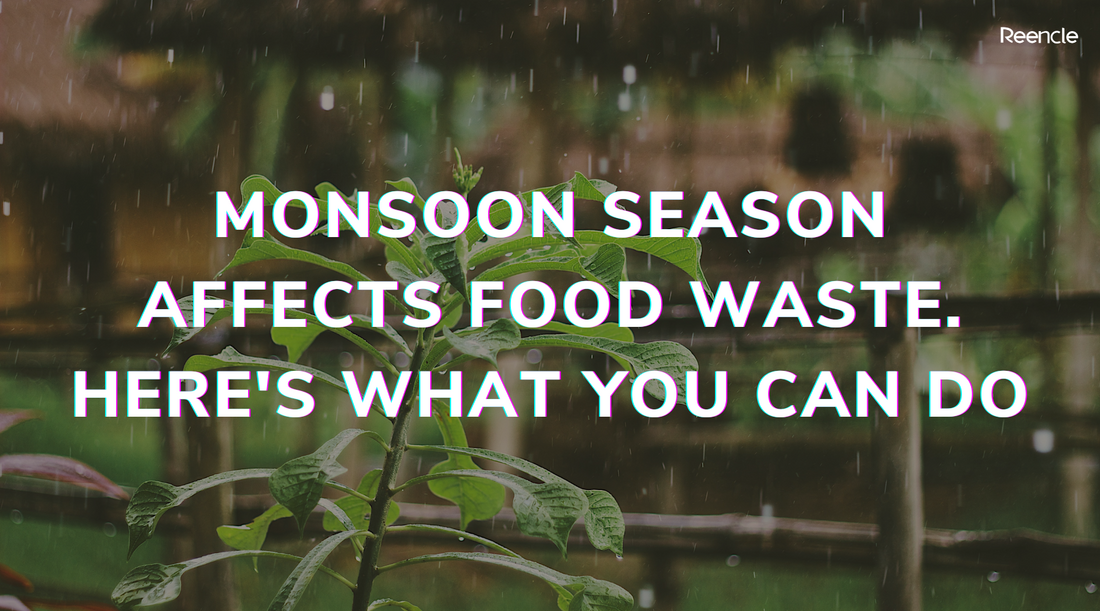The weather agency of Malaysia previously warned that the monsoon season said to begin around November 2022, would last until March 2023. As evidenced by the rather predictable heavy rains we see on a regular basis, it’s safe to say that this statement hit the nail on the head.
However, many people don’t realize that the monsoon season affects food waste, even if not always directly. The monsoon season is characterized by heavy winds and heavy rains and has an effect on our eating habits and health besides the climate.

Photo Credit: Sonika Agarwal
Effects of Monsoon Season
With the inevitable humidity that accompanies monsoon season, there’s usually an increase of mould, fungus, worms and of course, spoilage. This is largely due to the fact that these organisms typically thrive in moist and humid conditions that come with the monsoon season.
Besides that, allergies and digestive issues as well as water-borne diseases also generally increase during this season. Because of this, it’s important to reshape our habits - especially surrounding food, to accommodate this season in order to reduce waste.
The rainy weather during the monsoon season can also affect our immune system, increasing the importance of eating the right foods.
Preventing Food Waste during Monsoon Season - Foods To Avoid
Limit your purchases of sour foods like pickles and tamarind, as they can retain water and cause you to get bloated or feel unwell. Over-purchasing these types of foods may lead to wasting them when they affect your health over time.
Non-vegetarian foods also tend to be quite heating for the body, and can also have an acid-producing effect on our bodies. This can/has to be compensated by increasing vegetable intake. Foods that are high in protein can also make us dehydrated, as they require more water to be metabolized which can cause cells to lose water content.
You should also limit your consumption of dry fruits. Despite being healthy, they also contain less water than fresh fruits and can have high sugar content which both increases body heat.

Photo Credit: Kristine Wook
Treatments for Monsoon-Related Health Issues
Though a few ailments are unavoidable during the monsoon season, there are some things you can do to still get as much enjoyment out of the rainy season as possible. By introducing more nutritious foods to your diet and staying active, your overall health will be more well-rounded.
Try increasing your intake of fruits like peaches, papaya, plum and bitter gourd as these fruits contain high levels of fibres, antioxidants and vitamins A and C, which can all help you keep a good level of energy throughout the day.
You should also consume plenty of liquids during this season, as you’ll need hydration. Make sure your liquids are mostly boiled, safe water, though, as this is what will flush toxins out of your body.
Keeping Food Safe During Monsoon Seasons
To keep your grains safe, try adding neem leaves to your wheat and rice can help keep worms away. You should also store your grains in airtight containers and spread them out in the sun every 10 days or so, after which you should let them cool down before placing them in airtight containers again.
Store your sugar and salt in airtight containers, too, to avoid them from getting damp. You can also add a few grains of uncooked rice to absorb their moisture. Otherwise, moisture can make your sugar and salt turn clumpy and sticky due to the rainy weather.
If you have any bread at home, try consuming it within 2-3 days, as the moisture in the air can cause bread to go mouldy quicker than usual. Make sure you're not over-buying any bread, too.

Photo Credit: Nrd @ Unsplash
To make sure your fridge is "monsoon-ready", make sure it's clean and food is always covered. Regularly check if any of your food is going bad or growing mould and make sure to toss it out immediately. Let air circulate within your fridge - do this by making sure you're not over-stuffing it. Lastly, make sure you're keeping your meat and poultry frozen!
Hopefully these tips help you to reduce food waste and keep yourself healthy during the monsoon season!
It’s important to recognize how our surroundings affect our eating habits. We often buy food out of habit, but it sets the tone for so many other aspects of our lives. Because of this, it’s important that we shape our habits to optimize our wellbeing and the environment’s protection. If we continue purchasing groceries/food out of habit, it will inevitably lead to waste.

